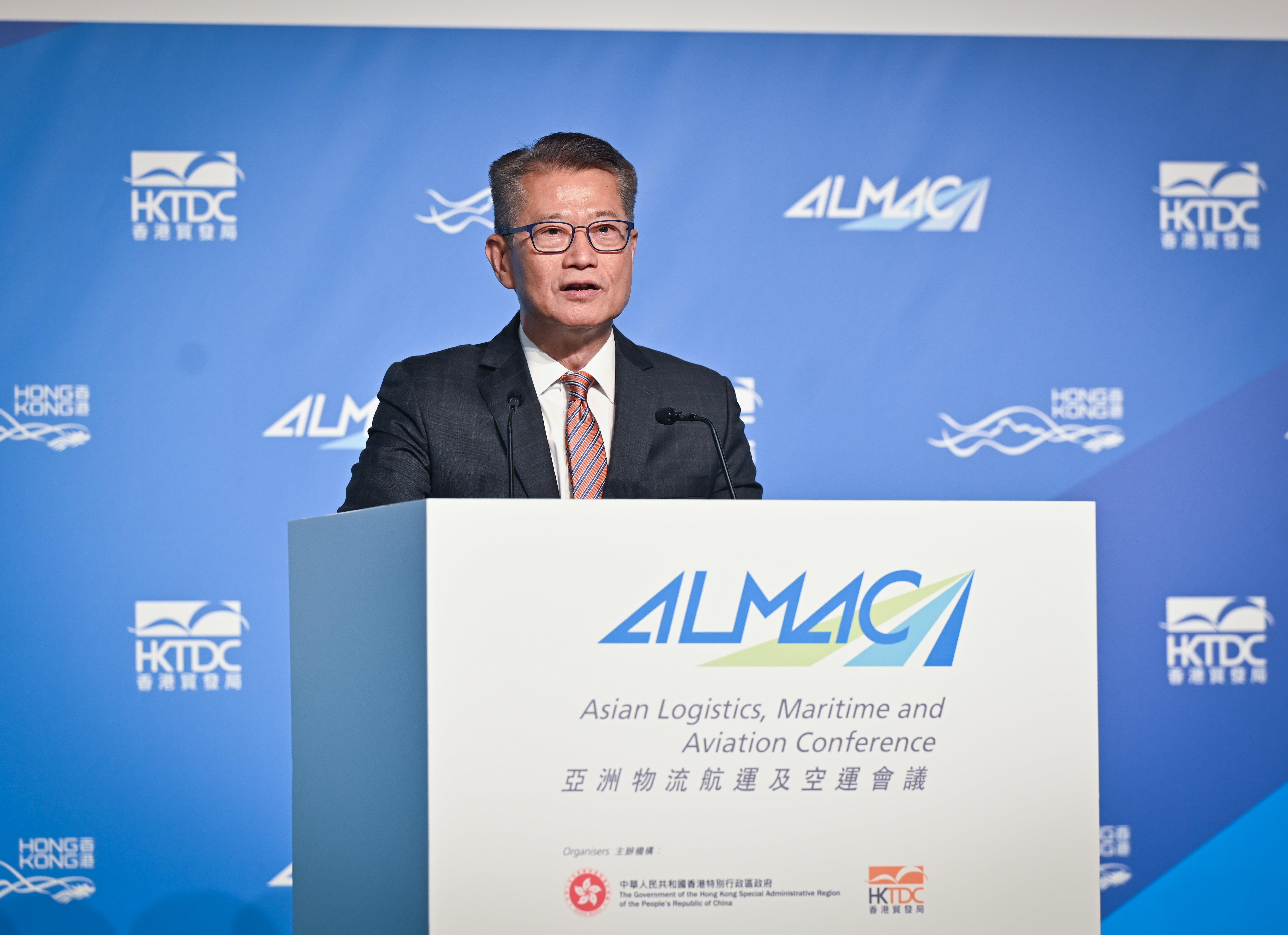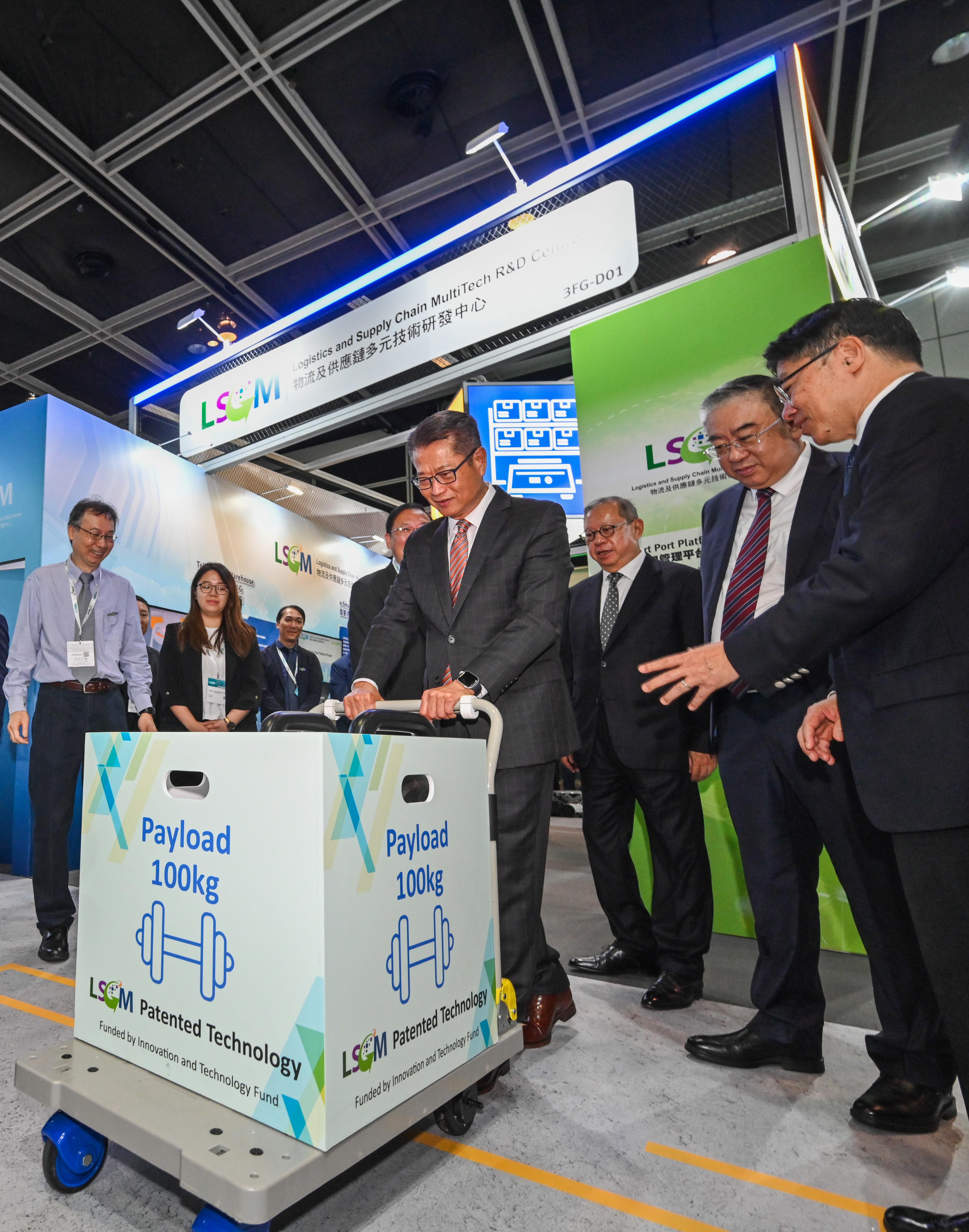 The Financial Secretary Paul Chan Mo-po delivers his speech at the Asian Logistics, Maritime and Aviation Conference 2023 on Nov 21 in Hong Kong. (PHOTO / HKSAR GOVERNMENT)
The Financial Secretary Paul Chan Mo-po delivers his speech at the Asian Logistics, Maritime and Aviation Conference 2023 on Nov 21 in Hong Kong. (PHOTO / HKSAR GOVERNMENT)
Hong Kong will remain committed to its super-connector role and be a platform providing high value-added logistics, maritime, aviation, financial and risk management services to meet rising demand for such services in the Association of Southeast Asian Nations, the Middle East, and Belt and Road countries and regions, Financial Secretary Paul Chan Mo-po told at the 13th Asian Logistics, Maritime and Aviation Conference 2023 on Tuesday.
READ MORE: Officials: HK strives to recharge global maritime industry
Organized by the Hong Kong Trade Development Council, the conference is the largest of its kind to be held in Asia, attracting more than 2,000 logistics, maritime and aviation industry professionals. Some 70 speakers from 15 countries and regions were invited to discuss the future of the global and regional supply chains.
There will be more business with ASEAN, the Middle East and, indeed, the Belt and Road countries. In other words, the demand for logistics, maritime and aviation services with and within this region will rise rapidly.
Paul Chan Mo-po, Financial Secretary
Vice-Minister of Transport Fu Xuyin, Secretary for Transport and Logistics Lam Sai-hung, HKTDC Chairman Peter Lam Kin-ngok, and other industry representatives attended the event.
Chan said the logistics, maritime and aviation industries are facing four major market trends that drive the need to diversify, and look for new markets and supply sources.
READ MORE: Chan: HK to optimize its global position in APEC
Amid slower global economic growth this year, high interest rates will persist, and governments worldwide have limited monetary policy options and fiscal space. Therefore, governments are eager to rebuild the resilience of their economies and the fiscal space to cushion future shocks.
Private sector resources would be pivotal in achieving net-zero targets in combatting climate change, which is a significant and pressing task.
Chan said there is also a need to return to a rules-based multilateral trading system, and strengthen the interconnectedness and cooperation in the face of rising protectionism, geo-fragmentation and the sequential disruptions to international trade, investments and supply chains.
 The Financial Secretary Paul Chan Mo-po (4th right) experiences an electronic assisting trolley system while attending the Asian Logistics, Maritime and Aviation Conference 2023 on Nov 21 in Hong Kong. (PHOTO / HKSAR GOVERNMENT)
The Financial Secretary Paul Chan Mo-po (4th right) experiences an electronic assisting trolley system while attending the Asian Logistics, Maritime and Aviation Conference 2023 on Nov 21 in Hong Kong. (PHOTO / HKSAR GOVERNMENT)
While emerging technologies, such as artificial intelligence, are transforming the economy and bringing tangible benefits, there is a consensus to manage the associated risks and enable better inclusion.
“Given the lingering geopolitics and geo-economic fragmentation, such as re-shoring, friend-shoring or even on-shoring, while traditional markets such as Europe and the United States will remain important, there is a need to diversify and look for new markets and new sources of supply,” Chan said.
READ MORE: HK to host young scientist summit on Dec 4
“That means there will be more business with ASEAN, the Middle East and, indeed, the Belt and Road countries. In other words, the demand for logistics, maritime and aviation services with and within this region will rise rapidly. The trade figures published by the Chinese mainland and economies in these regions have demonstrated such a clear trend.”
Chan pledged that Hong Kong will remain “committed to our super-connector role and be a platform providing high value-added logistics, maritime, aviation, financial and risk management services”
The special administrative region will continue to be a steadfast supporter of free trade and multilateralism, advocating a reduction in trade barriers, and the free flow of goods and services, people and capital, he said.


